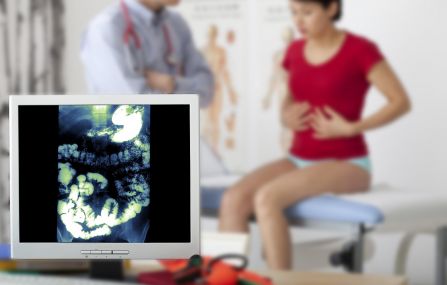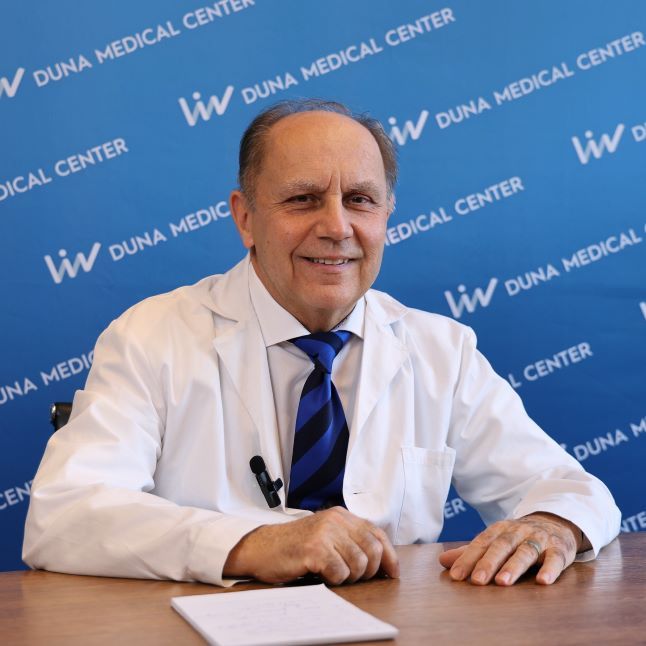 Gastroenterology is a specialized field of internal medicine dealing with digestive system disorders. At Duna Medical Center, we have highly trained specialists and excellent diagnostic options for identifying the cause of complaints and for treatment, which includes medication, lifestyle and dietary advice, as well as operative endoscopic and surgical interventions.
Gastroenterology is a specialized field of internal medicine dealing with digestive system disorders. At Duna Medical Center, we have highly trained specialists and excellent diagnostic options for identifying the cause of complaints and for treatment, which includes medication, lifestyle and dietary advice, as well as operative endoscopic and surgical interventions.
How does a gastroenterological examination take place?
The diagnosis of our patients is preceded by multiple examinations, depending on the symptoms and medical history:
In our laboratory, besides routine tests, we also offer special tests (e.g., food allergies).
We use two types of breath tests to identify different gastroenterological problems:
- The H2 breath test is suitable for detecting several diseases and sensitivities, depending on the test substance used.
- During the fructose H2 breath test, fructose intolerance, or fruit sugar intolerance, can be identified. The test is conducted on an empty stomach and takes 3 hours. There are numerous strict rules to follow before the test, about which the specialist will provide precise information.
- The lactose H2 breath test is suitable for diagnosing lactose intolerance or milk sugar sensitivity. Before the test, it is necessary to avoid dairy products and antibiotics. It's a fasting procedure, lasting 3 and a half hours. After consuming the test fluid, breath samples are taken into a special measuring instrument every 20 minutes.
- During the fructose H2 breath test, fructose intolerance, or fruit sugar intolerance, can be identified. The test is conducted on an empty stomach and takes 3 hours. There are numerous strict rules to follow before the test, about which the specialist will provide precise information.
- The UBT test detects Helicobacter pylori infection in the stomach. It's important to note that in our institution, this test is performed with a stable isotope, making it safe for children and pregnant women. You must arrive completely fasting for the test, i.e., you cannot eat, drink, take medication (in the 6 hours before the test), brush your teeth, or smoke (in the 12 hours before the test). Thirty minutes after consuming the test fluid, the patient breathes into the sampling device. The total duration of the test is 60 minutes.
Gastroscopy is the most commonly used examination for diagnosing the esophagus, stomach, and the initial section of the small intestine, during which the specialist guides a flexible video endoscope into the patient's upper gastrointestinal tract. This procedure is the best method for detecting reflux disease, ulcer disease, tumors, and inflammations. During the examination, it is also possible to take tissue samples and remove minor abnormalities.
Gastroscopy can be used in the following cases:
- To diagnose stomach ulcers, inflammations, polyps, tumors
- To investigate the causes of esophageal, stomach, and duodenal bleeding and upper abdominal pain, and to stop the bleeding
- For histological sampling
Colonoscopy is an endoscopic examination that looks inside the rectum, colon, and the last section of the small intestine. This examination method is particularly important because of the high incidence of inflammatory bowel diseases and tumors, with colon cancer being the second most common cause of death in Hungary. Colonoscopy can remove colon polyps in time, which are the cause of 80-90 percent of colon cancers. Therefore, colonoscopy should be performed in the following cases:
- To diagnose colon polyps, inflammations, tumors
- To remove colon polyps
- To investigate the causes of rectal and colon bleeding and lower abdominal pain
- For medical advice in cases of abdominal and defecation complaints
- For screening purposes
The examinations and procedures are carried out under pleasant conditions. If required by the patient, we can use deep sedation, so the patient feels no discomfort.
In addition to the above, we also offer imaging diagnostics (ultrasound, X-ray), performed by well-trained, experienced professionals skilled in recognizing gastroenterological symptoms.
If surgery is needed...
If a condition that can only be cured by surgery is discovered, our surgeons can perform a significant part of the interventions, and we can provide intensive observation and treatment for the post-operative period. You can read about our invasive gastroenterological surgical interventions by clicking here!
About reflux:
One of the most common gastroenterological diseases in developed countries, affecting 25-40% of adults according to statistics, is reflux. Reflux means the backflow of acidic and/or alkaline stomach contents into the esophagus, trachea, or oral cavity, which can erode, inflame the esophageal mucosa, and even lead to ulcers.
The most characteristic symptom is heartburn, which presents as uncomfortable pressure, pain, or burning sensation behind the sternum, but can also cause coughing, sore throat, or dry mouth. If heartburn occurs more than twice a week, the presence of reflux is suspected, and it is advisable to consult an internist/gastroenterologist.
Symptoms usually improve with lifestyle optimization and dietary changes, but medication is often necessary, and there are cases where surgical intervention is the solution.
What do we mean by lifestyle optimization?
- Avoid foods, alcohol, carbonated drinks, caffeine, and coffee that cause reflux!
- Quit smoking!
- Have dinner earlier than usual!
- Raise the head of the bed at night! Medication treatment options:
Over-the-counter options: we recommend taking antacids (e.g., Gaviscon) that can reduce or eliminate stomach acidity, relieving heartburn.
Prescription options:
H2 blockers (Ranitidine, Famotidine) can reduce symptoms for a short time. Proton pump inhibitors (Omeprazole, Controloc, Losec) can significantly reduce stomach acid production, their 4-6 week use significantly reduces symptoms, but their discontinuation often leads to the return of symptoms.
If the above treatments do not lead to results or cannot be maintained in the long term, surgical intervention may be considered, which you can read about in detail by clicking here.
PRESCRIPTION WRITING:
- We can only prescribe a prescription to a patient who has already visited our institution and for whom the prescription has been previously prescribed. For more information: https://dunamedicalcenter.org/en/news/we-help-you-not-to-be-without-medicine
- There is no extra cost for a prescription written during a specialised visit.
- The prescription(s) will be written during the doctor's office hours.
FOREIGN LANGUAGE DOCUMENT:
- All findings, results and outpatient forms are in Hungarian.
- If you would like it in English, you must notify us in advance, and there is an additional cost.
-
Anesthesia for gastroscopy and colonoscopyFrom 73 000 Ft
-
Anesthesia for gastroscopy or colonoscopyFrom 57 000 Ft
-
Biopsy (during endoscopic examination)From 15 000 Ft
-
Colonoscopy (colonoscopy)From 138 000 Ft
-
Cost of prescription issuance outside a specialist consultationFrom 7 000 Ft
-
Endoscopic polypectomy (polyp removal)From 84 000 Ft
-
Endoscopic polypectomy (sig. loop or min. 3 clips)From 134 000 Ft
-
Endoscopic polypectomy (standard loop, max. 2 clips)From 117 000 Ft
-
Endoscopic polypectomy additional sampleFrom 33 000 Ft
-
Gastroenterological control examinationFrom 37 000 Ft
-
Gastroenterology specialist examinationFrom 45 000 Ft
-
Gastroscopy (stomach endoscopy)From 97 000 Ft
-
Gastroscopy and colonoscopyFrom 218 000 Ft
-
Sedation for gastroscopy and colonoscopyFrom 44 000 Ft
-
Sedation for gastroscopy or colonoscopyFrom 39 000 Ft



